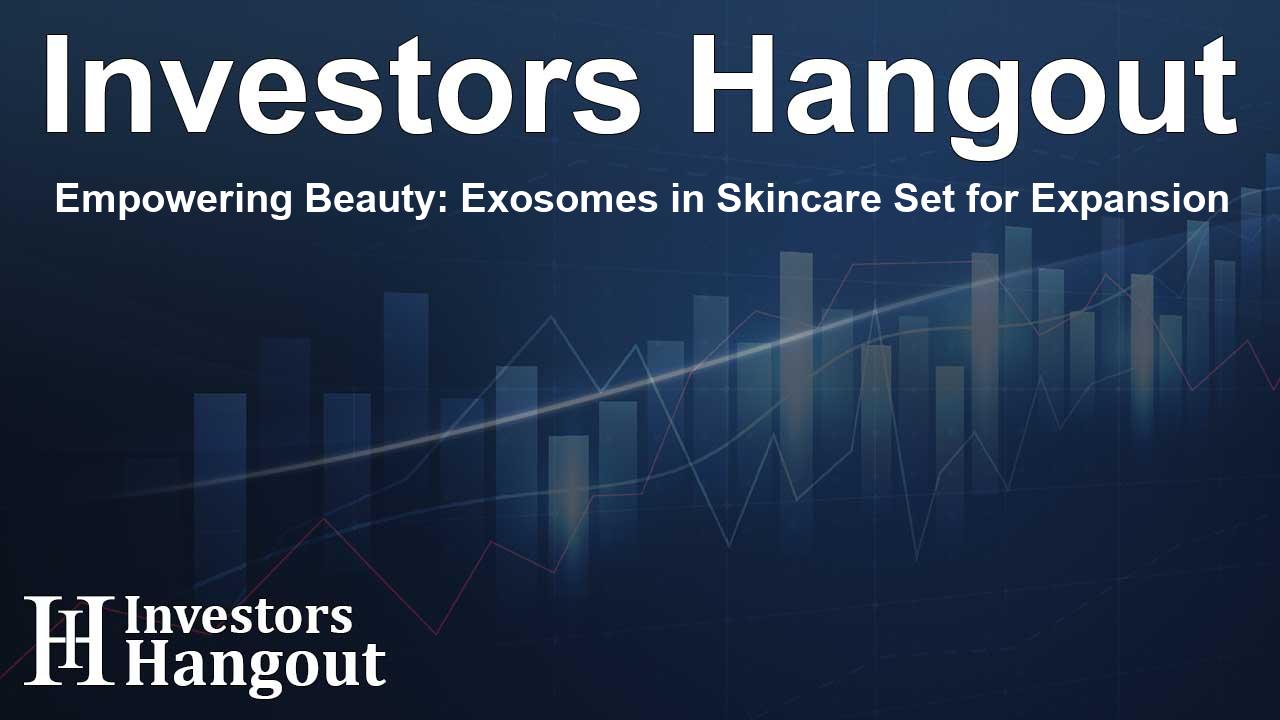Empowering Beauty: Exosomes in Skincare Set for Expansion

Exosomes Skincare Market Growth Prospects
As per recent insights, the global exosomes skincare market is projected to soar from USD 417.8 million to USD 809.5 million over the next few years, highlighting a remarkable growth rate of 9.9%. This surge presents enticing opportunities for skincare companies eager to innovate and meet evolving consumer demands.
Key Drivers of Market Expansion
One of the primary forces behind this projected growth is the escalating preference for next-generation skincare solutions. Modern consumers are increasingly seeking products that are effective and offer visible improvements without invasive procedures. Exosomes, known for their ability to rejuvenate skin, reduce inflammation, and boost collagen production, are making significant waves in the market. This shift towards advanced skincare technologies aligns perfectly with the growing interest in anti-aging solutions.
Consumer Trends Shaping the Market
Today's consumers are more informed and health-conscious than ever. With increasing awareness about skin health, they are gravitating towards advanced formulations backed by scientific research. This cultural shift is driving up the demand for exosome-based skincare products as they promise enhanced efficacy in addressing various skin concerns.
Product Types and Market Segments
Among the various segments, exosome serums are expected to lead the market, anticipated to dominate with two-fifths of the total market share. The forecast indicates that human-derived exosomes will generate significant revenue in the upcoming years, appealing particularly to consumers interested in cutting-edge skincare treatments.
Regional Insights on Market Dynamics
North America is poised to maintain a substantial footprint in the exosomes skincare market, projected to capture nearly 40% of the global share. This dominance is largely attributed to the region’s appetite for premium skincare products and the robust presence of industry leaders dedicated to innovation.
Meanwhile, Asia Pacific is steadily gaining momentum, emerging as a lucrative market due to shifts in beauty trends and a pronounced increase in demand for anti-aging solutions. This region is expected to constitute around a third of the global market by the projected timeline.
Challenges and Market Restraints
Despite favorable growth projections, some hurdles need addressing. High production costs associated with the extraction and purification of exosomes present barriers to wider market penetration, particularly in developing regions. Moreover, the exosome skincare industry faces stringent regulatory scrutiny due to the biological nature of its products, which can lead to increased development costs and delays in product launches.
Emerging Opportunities in the Skincare Market
Amidst these challenges, there are vast opportunities for companies willing to adapt. With a rising trend of consumers focusing on natural and regenerative skincare options, exosome-based formulations are well-positioned to meet this demand. Additionally, the growing influence of social media and collaborations between skincare brands and biotechnology firms are accelerating market growth. Notable industry collaborations are already being observed, which are expected to expedite product innovations.
Recent Innovations and Trends
The skincare landscape is continuously evolving, with advancements in exosome isolation and purification techniques significantly enhancing product efficacy. Innovations have enabled brands to develop a range of products, from serums to high-performance creams, that leverage the regenerative properties of exosomes. For example, recent collaborations, such as L'Oréal's partnership with innovative biotechnological firms, are setting a new standard for product formulations in the beauty sector.
Future Directions for Exosome-based Products
Looking forward, the demand for personalized skincare solutions is poised to escalate. Skincare brands are increasingly exploring the potential of exosomes to create targeted treatments tailored to address specific skin issues like acne scars and hyperpigmentation, further solidifying their place in the modern beauty arena.
Frequently Asked Questions
What is the projected size of the exosomes skincare market by 2032?
The market is estimated to reach USD 809.5 million by 2032, reflecting significant growth from current levels.
What are exosomes in skincare?
Exosomes are small vesicles that facilitate communication between cells, playing a vital role in skin rejuvenation and anti-aging.
Which regions are expected to dominate the exosomes skincare market?
North America is expected to maintain a dominant position, while Asia Pacific is emerging as a lucrative market for exosome skincare products.
What are the main challenges in the exosomes skincare industry?
High production costs and stringent regulatory requirements are major challenges facing the exosome skincare market.
How are companies innovating in this space?
Many companies are collaborating with biotech firms to develop advanced formulations and enhance the application of exosome technologies in their products.
About The Author
Contact Hannah Lewis privately here. Or send an email with ATTN: Hannah Lewis as the subject to contact@investorshangout.com.
About Investors Hangout
Investors Hangout is a leading online stock forum for financial discussion and learning, offering a wide range of free tools and resources. It draws in traders of all levels, who exchange market knowledge, investigate trading tactics, and keep an eye on industry developments in real time. Featuring financial articles, stock message boards, quotes, charts, company profiles, and live news updates. Through cooperative learning and a wealth of informational resources, it helps users from novices creating their first portfolios to experts honing their techniques. Join Investors Hangout today: https://investorshangout.com/
The content of this article is based on factual, publicly available information and does not represent legal, financial, or investment advice. Investors Hangout does not offer financial advice, and the author is not a licensed financial advisor. Consult a qualified advisor before making any financial or investment decisions based on this article. This article should not be considered advice to purchase, sell, or hold any securities or other investments. If any of the material provided here is inaccurate, please contact us for corrections.
